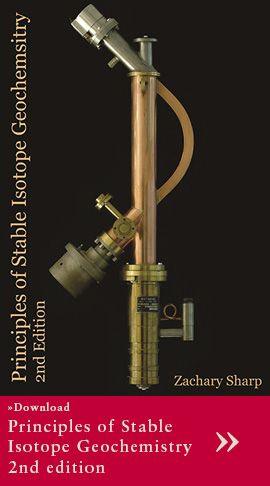An important component of the UNM-CSI mission is providing support for UNM students interested in applying stable isotopes to their own research. To facilitate this, CSI awards small pilot grants to pay analytical costs associated with stable isotope analysis. This is a short (1-2 pages; max 1000 words) proposal that would provide $500 towards analytical costs to generate pilot data for larger proposals. See our Sample Submission page for details regarding per sample analytical costs for routine isotope analysis at UNM–CSI.
To submit a proposal for a pilot grant, just email the document in pdf format to: csi@unm.edu. There are 3 submission deadlines every year, as follows:
February 15 ; June 15; October 15
Guidelines for Pilot Grants
- 1 per year per student (graduate or undergraduate)
- 1-2 pages, MAXIMUM OF 1000 words including in-text citations
- Reference section may be on a separate page, and should follow formatting guidelines of a peer-reviewed journal
- Times New Roman, 11pt font, 1” margins
- Should include the following sections:
- Problem/Background/Research Q’s (500 word max)
- Methods/Samples (250 word max)
- Implications/Predictions of Results (250 word max)
- References/Literature Cited (not included in word count)
Download a Pilot Grant Example.
Past reciepients of Pilot Grant Awards:
2018
Andrea Lopez (Department of Biology) – Response of aboveground litter decomposition to rainfall frequency and event size manipulation in a Chihuahuan desert grassland
Lauren Bansbach (Department of Biology) – Using d13C to study water-use efficiency in conifer seedlings regenerating after severe wildfire
Christopher Bayer (E&PS) : Bulk Organic carbon isotope ratios from Stoneman Lake AZ sediments as a proxy for glacial-interglacial cycles during the Holocene and Pleistocene
Camille Dwyer (E&PS): Constraining the Oxygen Isotopic Composition of Late Cretaceous Western Interior Seaway using δ18O of Benthic Bivalves
Gregor Hamilton (Department of Biology): A novel stable isotope approach to trace effects of invasive species on spatial subsidies across food webs
Shayne Halter (Department of Anthropology): Evaluation of Modern Chimpanzee Sites as Models for Early Hominin Habitats
Miranda LaZar (Department of Anthropology): Tracking Individual Fauna in the Archaeological Record and its Larger Implications in Ritual
Diana Macias (Department of Biology): Understanding global-change-type drought in piñon-juniper woodlands with carbon
2017
Alejandra De La Cruz (Department of Biology): Lipid Production by Bacteria in the Pyloric Caeca and Intestine of Trout
Kristin Pearthree (Department of Earth and Planetary Sciences): Investigation of paleohydrology and productivity of Lake Chalco, Mexico through analysis of organic matter stable isotopes
Paulina Lima (Department of Civil Engineering): Use of hydrogen and oxygen isotopes to understand runoff sources in Ecuadorian mountain streams and their contribution to hydropower projects
Cyler Conrad (Department of Anthropology): Galápagos Tortoise (Chelonoidis sp.) Dietary and Habitat Change during the 1850s-1970s
Nicholas Freymueller (Department of Biology): Foraging ecology of Desert Bighorn Sheep
Jenny Noble (Department of Biology): Using carbon and nitrogen isotopes to develop a forage quality index for mice
Marie Westover (Department of Biology): Investigating seasonal diet and molting in an alpine species using hydrogen isotopes
2016
Eva Dettweiler-Robinson (Department of Biology): Do fungi transfer nutrients between plants and biocrusts?
Jarek Kwiecinski (Department of Biology): Impacts of altered precipitation regimes on the spatial distribution of dryland soil nitrogen
Brittney H. Coe (Department of Biology): Using modern day tools to understand current and historic dietary preferences in desert small mammal communities
Adam Barkalow (Department of Biology): Investigating feeding ecology and resource of larval Catostomidae in the Colorado River within the Grand Canyon
Laura Pages Barcelo (Department of Biology): Exploring the use of hydrogen isotopes in marine ecosystems to better understand sea turtle diet
Deborah Boro (Department of Biology): Tissue incorporation windows under field conditions
Kelsey Cook (Department of Biology): Investigating niche-partitioning among three epiphytic orchids via mycorrhizal associations
2015
Rosalee Reese (Department of Biology) - Retrospective food web analysis of the Gila River: Do interactions between non-native and native fishes intensify during drought?
Marie Westover (Department of Biology) -Drivers of distribution and density at the edge of a threatened species (American pika:Ochotona princeps) distribution


